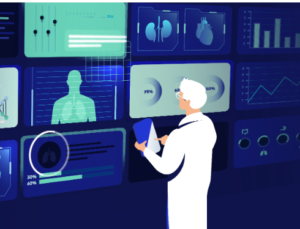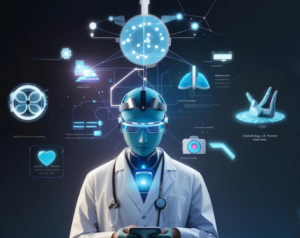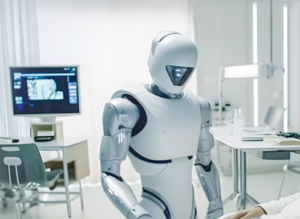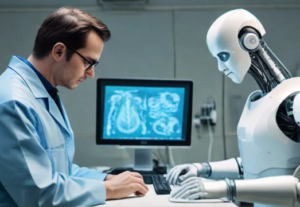
Artificial Intelligence (AI) is transforming every aspect of our lives, and healthcare is no exception. From diagnostics to personalized medicine, AI is poised to revolutionize the way we understand and treat diseases. As we move into the future, AI’s integration into healthcare will lead to more accurate diagnoses, efficient treatments, and improved patient outcomes.
1. Enhanced Diagnostics
One of the most promising applications of AI in healthcare is in the realm of diagnostics. AI algorithms can analyze medical images—such as X-rays, MRIs, and CT scans—with incredible precision, often surpassing the accuracy of human doctors. For instance, AI systems trained on vast datasets of medical images can detect early signs of conditions like cancer, cardiovascular diseases, and neurological disorders.

AI-driven diagnostic tools have the potential to identify anomalies that might be missed by the human eye. In dermatology, for example, AI can differentiate between benign moles and malignant melanoma with high accuracy, aiding early intervention. Similarly, AI algorithms can analyze retinal scans to detect diabetic retinopathy, a condition that can lead to blindness if not treated promptly. By providing quicker and more accurate diagnoses, AI can help healthcare professionals make informed decisions and tailor treatments to individual patients. Ai in healthcare
2. Personalized Medicine
AI has the potential to unlock a new era of personalized medicine. Traditional medical treatments often follow a “one-size-fits-all” approach, but AI can analyze a patient’s genetic makeup, lifestyle, and other factors to design individualized treatment plans. By processing vast amounts of data, including genomic information, AI can predict how a patient might respond to a particular drug or therapy, reducing the trial-and-error process that currently exists in many treatments.

For example, in oncology, AI can assist in identifying the most effective treatment protocols for cancer patients based on the genetic characteristics of their tumors. This personalized approach can improve survival rates and reduce the side effects of treatments. Furthermore, AI can continuously monitor patient data, adjusting treatments as needed to optimize outcomes.
Also read:The Future of AI Virtual Assistants and Home Modernization
3. Virtual Health Assistants and Chatbots
AI-powered virtual health assistants and chatbots are increasingly being used to support patients and healthcare providers. These tools can offer 24/7 assistance, providing patients with instant access to health information, appointment scheduling, and medication reminders. By using natural language processing (NLP) and machine learning, these virtual assistants can understand and respond to patient queries in a conversational manner.

For chronic disease management, virtual assistants can monitor patients’ symptoms and provide real-time feedback. For instance, an AI-driven app might remind a diabetic patient to take their insulin or alert them if their blood sugar levels are out of the normal range. This continuous support can help patients manage their conditions more effectively and reduce the burden on healthcare systems.
4. Predictive Analytics and Preventive Care
AI’s ability to analyze large datasets also opens up opportunities for predictive analytics in healthcare. By examining electronic health records (EHRs), lifestyle data, and other relevant information, AI can identify patients at high risk of developing certain conditions, such as heart disease or diabetes, even before symptoms appear. Early identification allows for timely intervention, which can prevent the progression of diseases and reduce healthcare costs.
Predictive analytics can also be applied to hospital operations. AI can predict patient admission rates, optimize staff allocation, and manage hospital resources more efficiently. For instance, during the COVID-19 pandemic, AI was used to predict the spread of the virus and allocate resources such as ventilators and ICU beds accordingly. This proactive approach to healthcare management can improve patient care and enhance the overall efficiency of healthcare systems.
5. AI in Drug Discovery and Development
Drug discovery is a complex, time-consuming, and costly process. AI has the potential to accelerate this process by analyzing vast datasets of chemical compounds and biological data to identify promising drug candidates. Machine learning algorithms can predict how different compounds will interact with specific targets in the body, reducing the time and cost involved in the early stages of drug development.

AI can also assist in repurposing existing drugs for new therapeutic uses. For example, during the search for COVID-19 treatments, AI was employed to sift through existing medications to identify candidates that might be effective against the virus. This approach not only speeds up the drug discovery process but also reduces the risks associated with bringing new drugs to market.
als0 read:The Future of Personalized Recommendations: How AI is Transforming Choices
6. Robotic Surgery and Automation
AI is also making its mark in the field of robotic surgery. Surgical robots, equipped with AI, can assist surgeons in performing complex procedures with precision and control that surpasses human capabilities. These systems can analyze preoperative data to guide surgical instruments in real time, minimizing the risk of human error and reducing recovery times for patients.
Furthermore, AI-driven automation is being used to streamline administrative tasks in healthcare. From automating billing processes to managing patient records, AI can reduce the administrative burden on healthcare providers, allowing them to focus more on patient care. Automation can also reduce errors in record-keeping, leading to better patient outcomes and improved healthcare efficiency.
7. Ethical Considerations and Challenges
While the potential of AI in healthcare is immense, it is not without challenges. Ethical considerations, such as patient privacy, data security, and the potential for bias in AI algorithms, need to be addressed. The use of AI involves the collection and analysis of sensitive patient data, raising concerns about how this data is stored, shared, and protected.
There is also the issue of bias in AI algorithms. If the datasets used to train AI systems are not representative of diverse populations, the resulting algorithms may not perform equally well for all patients. Ensuring that AI systems are fair, transparent, and accountable is crucial for their successful integration into healthcare.
The Future of Personalized Recommendations: How AI is Transforming Choices
8. The Road Ahead
Despite these challenges, the future of AI in healthcare looks promising. As AI technologies continue to evolve, they will become more integrated into everyday medical practice, enhancing the capabilities of healthcare providers and improving patient outcomes. The key to successful adoption will be a collaborative approach, where AI acts as an assistant rather than a replacement for healthcare professionals.

AI has the potential to make healthcare more accessible, affordable, and effective. By harnessing the power of AI, we can move towards a future where diseases are diagnosed early, treatments are tailored to individual needs, and healthcare systems are more efficient and responsive. The journey towards this future is just beginning, but the possibilities are boundless.
In conclusion, AI is set to play a transformative role in healthcare, driving innovations that will shape the future of medicine. From enhanced diagnostics to personalized treatments, AI has the potential to revolutionize how we approach health and wellness, making it one of the most exciting frontiers in modern medicine.
Also read:Role of AI in Autonomous Vehicles and the Future of Transportation
